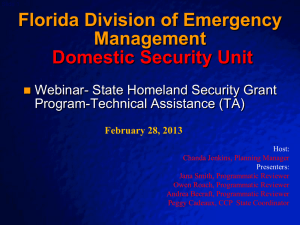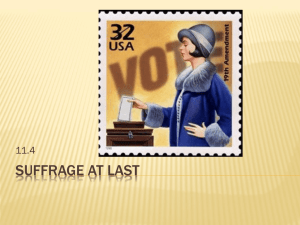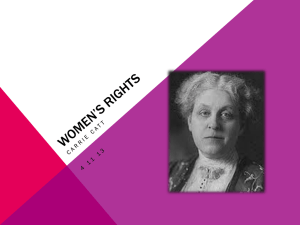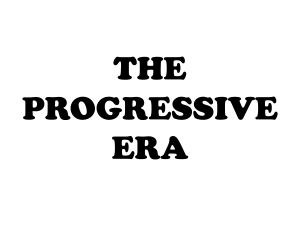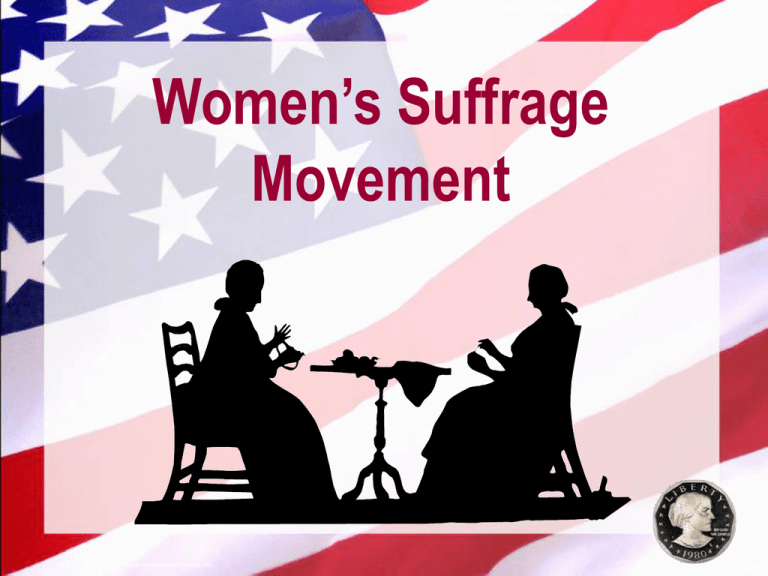
© 2004 By Default!
Women’s Suffrage
Movement
A Free sample background from www.awesomebackgrounds.com
Slide 1
© 2004 By Default!
When the United States Constitution was
written, only white men had the right to
vote. Women were not allowed to vote
under the law.
Women also did not have many other
rights such as the right to own property
or to be educated for certain jobs.
A Free sample background from www.awesomebackgrounds.com
Slide 2
© 2004 By Default!
The traditional roles:
Housewife
Mother
Limited education
No political influence
Women were prisoners in their own homes.
A Free sample background from www.awesomebackgrounds.com
Slide 3
© 2004 By Default!
The Education of Women:
American girls learn to read and write at
the Dame schools. They could attend the
Masters schools for Boys when there was
room.
A Dame school was an early form of a
private elementary school in Englishspeaking countries. They were usually
taught by women and were often located in
the home of the teacher
A Free sample background from www.awesomebackgrounds.com
Slide 4
© 2004 By Default!
Time line of women’s battles:
1776 Abigail Adams writes to her husband,
John Adams, asking him to "remember the
ladies" in the new code of laws. Adams
replies the men will fight the "despotism of
the petticoat."
1848 First Women's Rights convention in
Seneca Fall, New York. Equal suffrage
proposed by Elizabeth Cady Stanton After
debate of so radical a notion, it is adopted.
A Free sample background from www.awesomebackgrounds.com
Slide 5
© 2004 By Default!
Time line of women’s battles:
1872 Susan B. Anthony and supporters
arrested for voting. Anthony's sisters and
11 other women held for $500 bail. Anthony
herself is held.
1876 On July 4, in Philadelphia, Susan B.
Anthony reads The Declaration for the
Rights of Women from a podium in front of
the Liberty Bell. The crowd cheers. Later,
the suffragists meet in the historic First
Unitarian Church.
A Free sample background from www.awesomebackgrounds.com
Slide 6
© 2004 By Default!
Time line of women’s battles:
1878 Woman suffrage amendment
first introduced in US Congress.
1920 The Nineteenth Amendment,
called the Susan B. Anthony
Amendment, is ratified by Tennessee
on August 18. It becomes law on
August 26
A Free sample background from www.awesomebackgrounds.com
Slide 7
© 2004 By Default!
A Free sample background from www.awesomebackgrounds.com
Slide 8
© 2004 By Default!
The suffrage movement did not have
much success in the beginning and it
would be almost 80 years before U.S.
laws would be changed. Many women
and men worked very hard to bring
about these much needed changes in
the law.
Here are a few important people from the
suffrage movement:
A Free sample background from www.awesomebackgrounds.com
Slide 9
© 2004 By Default!
Susan B. Anthony
Susan B. Anthony was born February 15, 1820 in
Adams, Massachusetts. She was brought up in a
Quaker family with long activist traditions. Early in
her life she developed a sense of justice.
A Free sample background from www.awesomebackgrounds.com
Slide 10
© 2004 By Default!
Elizabeth Cady Stanton
In 1851 Stanton met Susan B.
Anthony and for the next fifty
years they worked together.
Stanton wrote and gave speeches that called
for the improvement of the legal and traditional
rights of women, and Anthony organized and
campaigned to achieve these goals.
A Free sample background from www.awesomebackgrounds.com
Slide 11
© 2004 By Default!
Lucretia Mott
Lucretia Mott helped to organize and call
together the first women's rights convention
in Seneca Falls, New York in July of 1848.
A Free sample background from www.awesomebackgrounds.com
Slide 12
© 2004 By Default!
Sojourner Truth
Truth became a speaker on women's rights
issues after attending a Women's Rights
Convention in 1850.
A Free sample background from www.awesomebackgrounds.com
Slide 13
© 2004 By Default!
Anna Howard Shaw
was a doctor as well as the first
woman Methodist Methodist
Minister. She met Susan B.
Anthony in 1888 and began
working for women’s rights.
She was the president of the National
American Women Suffrage Association
(NAWSA) for 11 years.
A Free sample background from www.awesomebackgrounds.com
Slide 14
© 2004 By Default!
A Free sample background from www.awesomebackgrounds.com
Slide 15
© 2004 By Default!
Carrie Chapman Catt
Catt was president of the NAWSA when the
19th amendment giving women the right to
vote was passed in 1920.
A Free sample background from www.awesomebackgrounds.com
Slide 16
© 2004 By Default!
Esther Morris
was the first woman to
hold public office in the
United States. In 1870,
she was appointed Justice
of the Peace (not without
some controversy) for
South Pass City, Wyoming
Territory
A Free sample background from www.awesomebackgrounds.com
Slide 17
© 2004 By Default!
A Free sample background from www.awesomebackgrounds.com
Slide 18
© 2004 By Default!
The state of Tennessee was the 36th
state to approve the law. Their approval
gave the amendment the majority it
needed to become a law.
Finally after years of hard work, the 19th
Amendment was added to the
Constitution of the United States in
August of 1920.
A Free sample background from www.awesomebackgrounds.com
Slide 19
© 2004 By Default!
Amendment XIX
The right of citizens of the United States
to vote shall not be denied or abridged
by the United States or by any state on
account of sex.
The End
(but really just the beginning)
A Free sample background from www.awesomebackgrounds.com
Slide 20
© 2004 By Default!
Politics
1917 Jeanette Rankin, first member of the
US House of Representatives from Montana
(before women had the right to vote in most
of the United States)
1968 Shirley Chisholm first black woman
elected to the House of Representatives
from New York.
A Free sample background from www.awesomebackgrounds.com
Slide 21
© 2004 By Default!
Politics
1984 Geraldine Anne Ferraro was the 1st
female Vice Presidential candidate
representing a major American political party
(Democratic Party).
2008 Sarah Palin, was the 1st female Vice
Presidential candidate representing the
Republican Party
A Free sample background from www.awesomebackgrounds.com
Slide 22
© 2004 By Default!
1.
2.
3.
4.
5.
Work Cited
Britannica online. “women’s rights.” 2002.
Student Resource Center. “Women’s rights on
agenda.” Fiedler, Anne Akia. IC publications Ltd.
1999.
MSN. “Women’s rights.” Microsoft Corporation. 2001.
Ask Jeeves. “Women’s history in America.” 1994.
HistoryChannel.com. Feminism. Columbia University
press. 2000.
Compiled and edited by Susan Ging Lent
A Free sample background from www.awesomebackgrounds.com
Slide 23




